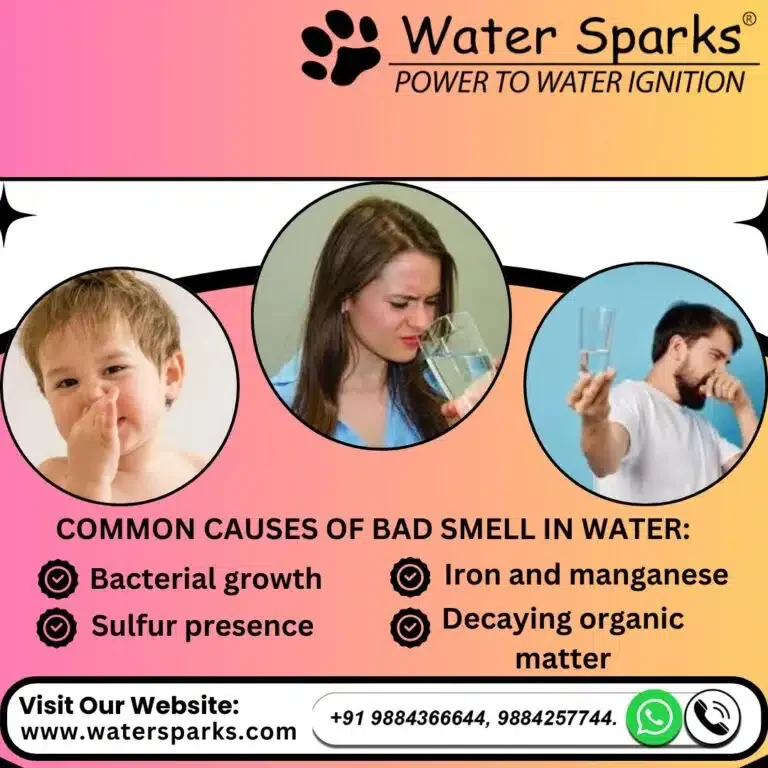The Stench of Bad Smell Water: Causes, Effects, and Solutions by Water Sparks
At Water Sparks, we understand the frustration and health concerns that come with bad smell water. Our team of experts is dedicated to helping you identify and address the root causes of unpleasant odors in your water.
Bad-smelling water is not just a minor inconvenience; it can indicate underlying problems with your water supply or plumbing system. Understanding the causes, recognizing the effects, and applying effective solutions are essential for maintaining clean, safe, and pleasant-tasting water. This comprehensive guide will delve into the common causes of bad-smelling water, the potential effects it can have, and practical solutions to resolve the issue.

Causes of Bad-Smelling Water
- Hydrogen Sulfide (H₂S): One of the most common causes of bad-smelling water, hydrogen sulfide, gives water a distinctive “rotten egg” smell. This gas is often produced by bacteria that thrive in anaerobic (low-oxygen) environments or from decaying organic matter. It is particularly prevalent in well water and can be exacerbated by high temperatures or specific groundwater conditions.
- Iron and Manganese: These metals can impart a metallic or earthy odor to water. Iron and manganese are naturally occurring elements in soil and rock that can dissolve into groundwater. When exposed to air or certain bacteria, these elements can oxidize and cause unpleasant smells. This issue is especially common in well water sources.
- Chlorine and Chloramine: Municipal water systems use chlorine and chloramine as disinfectants to kill harmful bacteria and pathogens. While effective in purifying water, these chemicals can leave a residual taste and smell. Chlorine often imparts a bleach-like odor, whereas chloramine has a more subtle chemical smell. Some people find these odors particularly off-putting.
- Contaminants: Organic materials, sewage, or other pollutants can lead to bad-smelling water. Contaminants from sources such as septic systems, agricultural runoff, or industrial discharge can introduce foul odors into the water supply. These contaminants can affect not only the smell but also the safety of the water.
- Corroded Pipes: Old or poorly maintained pipes can corrode and interact with water, resulting in a metallic or musty smell. Pipe corrosion is often a sign of more extensive plumbing issues and can lead to water discoloration and deterioration of water quality.
Effects of Bad-Smelling Water
-
- Health Risks: Bad-smelling water can sometimes indicate the presence of harmful bacteria, chemicals, or other contaminants. For example, hydrogen sulfide may be associated with other harmful substances, such as bacteria that cause gastrointestinal or respiratory issues. Contaminants from sewage or industrial pollutants can pose serious health risks, including infections or long-term health problems.
- Aesthetic Discomfort: Even if the water is technically safe, unpleasant odors can make it unappealing for drinking, cooking, and bathing. This can lead to decreased water consumption and general dissatisfaction with the water supply, affecting your overall quality of life.
- Plumbing Damage: Prolonged exposure to corrosive elements or contaminants can damage plumbing systems. Corrosion from metal elements or chemical reactions can lead to leaks, blockages, and other plumbing issues. This not only requires costly repairs but can also further affect water quality.
- Environmental Impact: If bad-smelling water is due to contamination, it may have broader environmental consequences. Pollutants and chemicals can enter local water sources, affecting aquatic ecosystems and potentially harming wildlife. Addressing contamination issues is crucial for protecting both human health and the environment
Solutions for Bad-Smelling Water by Water Sparks
1.Conduct Water Testing: Our team at Water Sparks can help you conduct thorough water testing to identify specific contaminants or issues causing the odor.
2.Install Filtration Systems: We offer various filtration systems to address different water quality issues, including activated carbon filters, iron and manganese filters, and hydrogen sulfide filters.
3.Use Water Softeners: Our experts can help you determine if a water softener is the right solution for your iron or manganese-related odor issues.
4.Disinfect Water: We provide UV purification and chlorination services to eliminate bacterial contamination.
5.Maintain Plumbing Systems: Our team offers regular maintenance and inspection services to prevent and address odor issues related to pipe corrosion.
6.Apply Chemical Treatments: Our experts can guide you on the appropriate chemical treatments for your specific water quality issues.
Conclusion
Bad-smelling water can be a serious issue, but with Water Sparks, you can enjoy fresh, clean water and a healthier lifestyle. Our team of experts is dedicated to providing effective solutions to eliminate unpleasant odors and contaminants from your water.
Bad-smelling water is more than just a nuisance; it can signal significant issues with your water supply or plumbing system. By understanding the causes, recognizing the potential effects, and implementing the right solutions, you can address the problem effectively. Conducting thorough water testing, installing appropriate filtration and disinfection systems, maintaining your plumbing, and applying targeted treatments are key steps in resolving water odor issues.
